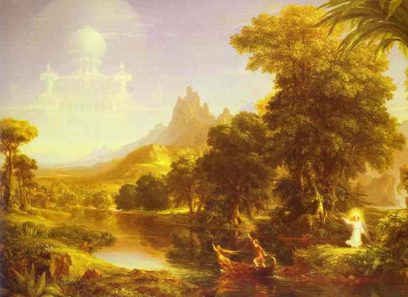One day Changsha went off to wander in the mountains. When he returned, the temple director met him at the gate and asked, “So, where have you been?”
Changsha replied, “I’ve been strolling about in the hills.”
“Which way did you go?”
“I went out following the scented grasses and came back chasing the falling flowers.”
The director smiled. “That’s exactly the feeling of spring.”
Changsha, agreed, adding, “It’s better than autumn dew falling on lotuses.”
Blue Cliff Record, Case 36
These are hard times. And in hard times it can be difficult to see beyond our woes. While it is critical we do not turn away from the sadness, and particularly the sadnesses we have caused, that’s never the whole picture. And within that context I’ve found myself thinking of that little story of Changsha and his stroll.
The Blue Cliff Record had several editors. Xuedou was the first, gathering the one hundred stories of The Blue Cliff sometime in the eleventh century, and adding a word or two of his own by way of comment. Xuedou’s comments are usually pithy, and often cut through right to the heart of the matter. In fact, as this particular case is published, it includes a little coda from Xuedou. After Changsha’s description of following scented grasses and falling flowers, and the director’s appreciation, and Changsha’s pointed conclusion, Xuedou adds his own: “I’m grateful for this answer.”
Me too. It points us on with a gentle hand. More than most stories from the world’s treasure trove of spiritual teachings, this story of spring flowers and autumn dew points directly to the secret of our path. So, what might be the secret that, if we hold it true, makes noticing the turning of spring to summer—of picnics, and walks in the woods—the stuff of a spiritual life? I suggest a re-read of Henry Thoreau’s Walden might be interesting, but, really, this anecdote has all we need.
First, let’s look at the line, “I went out following the scented grasses.” Everything is in flower, as those among us with allergies can attest. The world is alive. We are alive. Notice it. Feel it. Throw yourselves into the moment, not some other moment—this one. For Changsha, it’s a walk in the countryside.
But also there’s that line about the autumn dew: “It’s better than autumn dew falling on lotuses.” Here we’re also reminded, and really, invited into the cosmic play, found for us as flashes of insight throughout our lives but most commonly noticed when we’re quiet. It is our intimation of interconnections so vast, so very vast that you and I—indeed everything we can name—collapses, like a star pulled into a black hole, where even words like “interconnected web,” or, my preferred term, “boundless,” slightly miss the point.
Perhaps you’ve had that taste of reality in all its vastness. It’s a gift of our humanity, encountered by rich and poor, by educated and ignorant. Now and then we all catch a moment of its truth, like a flash of lightning in a summer storm. Or, maybe it just haunts an occasional dream. The point is this: The deep connections that our tradition sings of, the perspective we are all woven together so fine, that we can’t even find our separateness, is an important encounter. I would even call it the God beyond God. But again the words fail, collapsing into something more than a black hole. For those of us who’ve noticed this experience, we might recognize that description of autumn dew falling on a lotus.
And it is important to notice this big thing, however we name it. It ties us together and puts the lie of our separateness and sense of isolation to rest. But Changsha adds in something. We don’t live there. Or, rather, and in fact more important, we find that vastness nowhere but in things—and not things in general—but specific things. The person sitting next to you reveals that whole. Your own experience of this moment manifests the universe itself and the space beyond naming. The whole interdependent web is revealed in a single flower.
So, again, we must not turn from the sadnesses of the world. We have too much work to do. And, let’s not forget how large the project really is.
Changsha calls us to the world, of the precious individual, of scented flowers. Here, we’re invited to see how that boundless place, that black hole of all ideas and separateness, is also this place. Everything may be tied up together in some great cosmic play that is so vast our words fail to convey it. But it is also nothing other than you and me.













